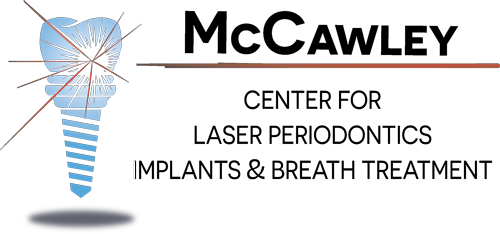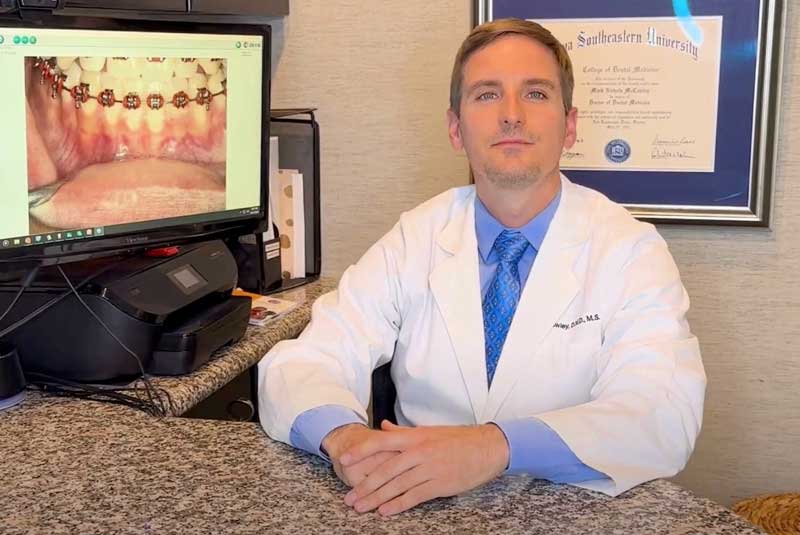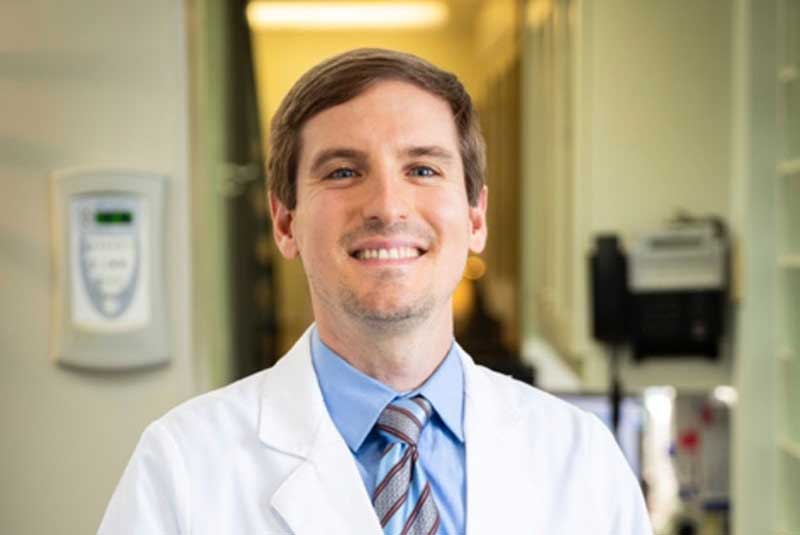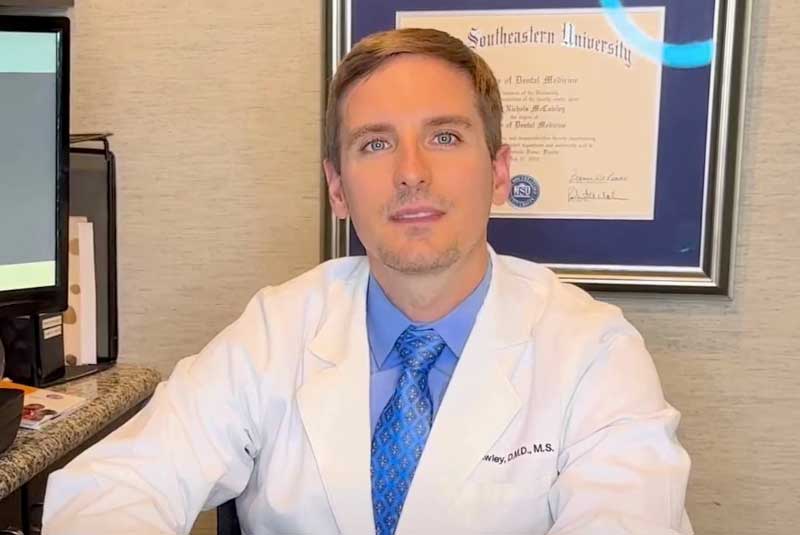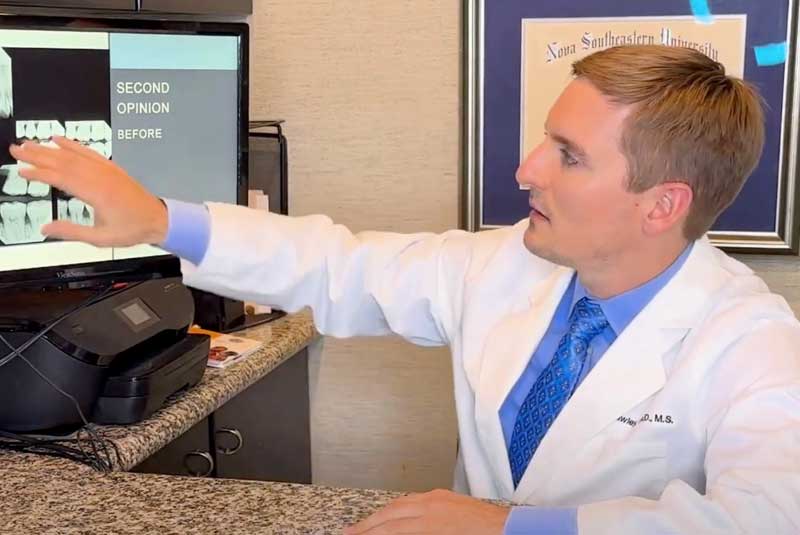Avoid Losing Your Teeth From Periodontal Disease
Gum Disease Treatment in Fort Lauderdale
New Patient Special $79 Exam Including X-Rays ($475 Value!). Please Call To Ask About Our New Patient Specials. Second Opinions Welcome.
Gum disease can impact more than just your smile. If you have recently received a diagnosis, it is natural to feel concerned about the potential for tooth loss, surgical procedures, or long-term damage.
At the McCawley Center for Laser Periodontics and Implants, you will find expert care in a supportive environment. Our experienced team provides advanced, minimally invasive laser treatments that are designed to stop the progression of gum disease and support long-term oral health. We have helped thousands of patients restore their confidence and protect their smiles.
We offer gum disease treatment at our periodontal office in Fort Lauderdale, FL.
What Is Gum Disease?
Gum disease, also known as periodontal disease, is a bacterial infection that damages the tissues and bone supporting your teeth causing you to lose your teeth.
It is an inflammatory condition that starts when a sticky film of bacteria called dental plaque builds up around the gum line. Over time, this bacteria irritates the gums, causing them to pull away from the teeth.
As the disease progresses, it can create deep pockets, damage soft tissue, and break down the underlying bone structure. If left untreated, it will lead to bone loss, loose teeth and tooth loss.
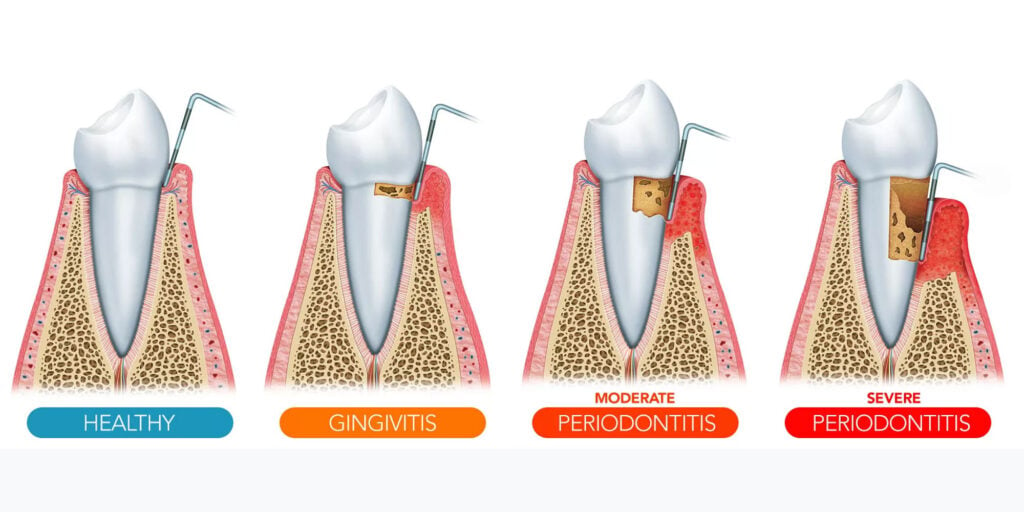
The Stages of Gum Disease
Understanding the stages of gum disease can help you recognize problems early and seek timely care. Gum disease progresses in three stages:
- Gingivitis: The earliest and mildest form. At this stage, the infection has not yet reached the bone. Gingivitis is reversible with consistent oral hygiene, professional dental cleanings, and early intervention.
- Moderate periodontitis: At this stage, bacteria have begun to attack the bone and connective tissues that support your teeth. Periodontal pockets begin to form. Treatment may involve scaling and root planing, antimicrobial therapy, or laser-assisted cleaning to halt further progression.
- Advanced periodontitis: The most severe form. The infection causes significant bone loss, deep periodontal pockets, and loose or shifting teeth. Without treatment, tooth loss becomes likely. Advanced cases often require laser surgery (such as LANAP), regenerative therapies, and ongoing periodontal maintenance to preserve remaining teeth.
The Symptoms of Gum Disease
Periodontal disease is often painless in the early stages. That’s why routine dental checkups and cleanings are critical.
If you experience any of the following, it may be time to schedule a check-up:
- Swollen, red gums that bleed when brushing or flossing
- Persistent bad breath or a bad taste in the mouth
- Gum recession (teeth look longer)
- Loose teeth or changes in bite
- Painful chewing or sensitive teeth
- Pus between teeth and gums
Certain factors can increase your risk for gum disease. These include:
- History of gum disease
- Crooked teeth
- Dry mouth
- Systemic conditions like diabetes and cardiovascular disease
- Lifestyle habits such as smoking, chewing tobacco or vaping
Gum Infections and Loose Teeth
When gum infections are left untreated, they can quietly undermine the foundation of your smile. While most infections are preventable with good oral hygiene and regular professional cleanings, once infection sets in, the stakes become much higher.
Bacteria target the gum tissue first, causing inflammation and gum recession. As the infection worsens, it exposes the roots of the teeth, weakens their support, and can lead to tooth mobility or loss. And when a tooth is lost, the bone around it begins to deteriorate.
Quick treatment is essential. The earlier we intervene, the more likely we are to preserve your natural smile.
Missing Teeth and Dental Implants
To avoid long-term complications, it’s important to replace missing teeth as soon as possible. Without a tooth, the surrounding bone begins to shrink due to lack of stimulation. The longer a tooth is missing, the more bone loss is likely to occur.
Dental implants are designed to act like real teeth in both function and structure. Surgically placed into the jawbone, they provide stable support while helping to preserve the bone through daily use. If significant bone loss has already occurred, we may recommend bone grafting to rebuild the area before implant placement.
We specialize in laser-assisted treatment for patients with gum disease and missing teeth. Our approach often includes combining regenerative therapies with dental implants to restore both function and long-term stability.
Why Treat Gum Disease Early?
Gum disease affects more than just your oral health. Left unchecked, the bacteria in your gums can enter the bloodstream and trigger inflammation throughout the body.
Research continues to uncover strong connections between periodontal disease and overall health:
- A study by the American Heart Association found that people with gum disease are 28% more likely to experience a first heart attack. [1]
- Chronic oral infections tied to gum disease have been associated with Alzheimer’s disease. One study published in the Journal of Neuroinflammation found signs of gum-related bacterial infection in 90% of Alzheimer’s patients. [2]
- Gum disease has also been linked to a 38% increased risk of pancreatic cancer. [3]
- For individuals with weakened immune systems, untreated gum disease can triple the risk of fatal pneumonia. [4]
- Additional research shows links between gum disease and complications related to diabetes, rheumatoid arthritis, and even stroke. [5]
Our Approach to Gum Disease Treatment
We do more than treat symptoms. We identify and eliminate the bacterial root of the infection so you can enjoy long-term oral health.
We focus on restoring long-term gum health using advanced, evidence-based therapies. Every treatment plan is personalized based on the stage of gum disease, your comfort preferences, and the presence of any underlying risk factors.
Antimicrobial Therapy
Antimicrobial therapy begins with identifying the specific bacteria contributing to your infection.
Using a phase-contrast microscope, we examine a live sample of bacteria from beneath your gums during your initial exam. We can detect the kinds of bacteria that are actively damaging your gum tissue.
In some cases, we also send a sample to an outside lab for bacterial culturing. This allows us to select the most effective antibiotic treatment for your specific condition.
Laser Periodontal Treatment (LANAP®)
We use the LANAP® protocol to gently remove diseased tissue, disinfect periodontal pockets, and stimulate the growth of new bone and connective tissue.
LANAP offers distinct advantages over traditional surgery:
- No cutting or stitches
- Selective removal of infected tissue
- Less pain and swelling
- Short recovery time
- Preservation of healthy teeth and gum tissue
In clinical studies, 85% of LANAP patients became culture-negative for harmful bacteria immediately after treatment. This compares to only 16% who received ultrasonic cleaning alone.
Deep Cleaning (Scaling and Root Planing)
Scaling and root planing is a non-surgical treatment that removes tartar and plaque buildup below the gumline.
Smoothing the root surfaces helps discourage bacteria from reattaching and allows the gum tissue to heal more effectively.
Ongoing Supportive Care
To maintain healthy gums and prevent relapse, we recommend:
- Frequent cleanings: For patients with ongoing risk factors for periodontitis.
- Patient education: We help you build healthy oral hygiene practices at home.
Your long-term results depend on consistent professional cleaning, daily brushing and flossing, and regular care tailored to your needs.
Why Choose McCawley Center For Laser Periodontics & Implants?
- Decades of Experience: With over 50 years in Broward County, our team combines trusted care with leading-edge technology.
- Pioneers in Laser Dentistry: We were the first U.S. practice to introduce the Nd:YAG laser and have performed thousands of LANAP® and LAPIP® procedures.
- Bacteria-Focused Diagnosis: We have examined over 150,000 slides and processed thousands of cultures to personalize treatment and improve outcomes.
- Comprehensive Care: From sedation options to ongoing education, we prioritize your comfort and long-term oral health every step.
Frequently Asked Questions
Yes, the bacteria that cause gum disease can be spread through saliva. Sharing utensils, kissing, or using the same toothbrush can transfer bacteria.
While gum disease itself isn’t fatal, the bacteria involved have been linked to life-threatening conditions like heart disease, stroke, and systemic infections. Treating gum disease can reduce these risks.
Yes, gum disease can be reversed in its earliest stage, gingivitis, through consistent home care and professional cleanings. More advanced stages can be stabilized and often cured through professional and personal home care.
Antibacterial mouthwashes containing chlorhexidine or essential oils can help reduce plaque and inflammation. We may recommend a specific rinse based on your condition.
Toothpaste with stannous fluoride, or baking soda may help fight gum disease. Look for products approved by the ADA and ask us for personalized recommendations.
Not necessarily. With early detection and gum disease treatment like LANAP, we can often preserve the bone and tissue needed to support your teeth.
Most patients report minimal discomfort. The laser targets diseased tissue only, which means less trauma and a faster recovery compared to traditional surgery.
Daily tongue cleaning, brushing and flossing and irrigation with antiseptics suggested by our office, avoiding tobacco products, regular dental cleanings, and managing conditions like diabetes all help reduce the risk of recurrence.
References
- Periodontitis Increases the Risk of a First Myocardial Infarction: A Report From the PAROKRANK Study LINK
- Wang, R.PH., Huang, J., Chan, K.W.Y. et al. IL-1β and TNF-α play an important role in modulating the risk of periodontitis and Alzheimer’s disease. J Neuroinflammation 20, 71 (2023). LINK
- Xu S, Wang HL, Xia C, Lv J, Zhang G. Associations Between Poor Oral Hygiene and Risk of Pancreatic Cancer: A Meta-analysis of Observational Studies. Pancreas. 2022 Sep 1;51(8):985-994. doi: 10.1097/MPA.0000000000002143. PMID: 36607944; PMCID: PMC9835655. LINK
- Bansal M, Khatri M, Taneja V. Potential role of periodontal infection in respiratory diseases – a review. J Med Life. 2013 Sep 15;6(3):244-8. Epub 2013 Sep 25. PMID: 24155782; PMCID: PMC3786481. LINK
- Oral Systemic Health LINK
Schedule Your Consultation in Fort Lauderdale Today
If you have been told you have gum disease, loose teeth, or need surgery, we can help. Our advanced laser techniques make treatment more comfortable and effective.
Dr. Tom McCawley and Dr. Mark McCawley offer personalized periodontal care designed around your needs, comfort, and long-term results.
To book an appointment at our periodontal office in Fort Lauderdale, FL, call (954) 807-4829 or visit us at 800 East Broward Blvd #706 Fort Lauderdale, FL.
